| Listing 1 - 10 of 2664 | << page >> |
Sort by
|
Dissertation
Year: 1982 Publisher: Liège : Université de Liège, Faculté des sciences (ULg),
Abstract | Keywords | Export | Availability | Bookmark
 Loading...
Loading...Choose an application
- Reference Manager
- EndNote
- RefWorks (Direct export to RefWorks)
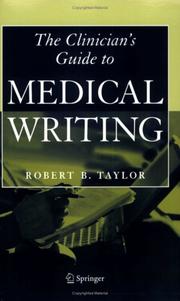
ISBN: 1280608390 9786610608393 0387270248 0387222499 Year: 2005 Publisher: New York : Springer,
Abstract | Keywords | Export | Availability | Bookmark
 Loading...
Loading...Choose an application
- Reference Manager
- EndNote
- RefWorks (Direct export to RefWorks)
This book teaches what clinicians need to know about medical writing and publishing. It is for the physician, physician assistant, or nurse practitioner who sees patients and also wants to contribute to the medical literature, as well as for the assistant professor aspiring to promotion. It is written from the viewpoint of the clinician seeking the personal enrichment that writing can bring. Readers learn how to translate observations and ideas from practice into written form and eventually into print. The guide for this journey is Dr. Robert B. Taylor, a distinguished leader in academic family medicine. With a clear, conversational writing style, Dr. Taylor shares what he has learned—what works and what doesn’t—through the course of publishing 22 medical books and several hundred papers. He draws from his successes (and some failures) as he tells helpful ways to write review articles, case reports, editorials, letters to the editor, book reviews, book chapters, reference books, and research reports. Loaded with practical advice and real-world examples, this text benefits readers who are new to medical writing and those who have authored a few articles or chapters and want to improve their skills.
Medical writing. --- Technical writing. --- Engineering --- Science --- Scientific writing --- Technology --- Authorship --- Communication of technical information --- Hygiene --- Medicine --- Public health --- Technical writing --- Family medicine. --- Emergency medicine. --- Medicine. --- General Practice / Family Medicine. --- Primary Care Medicine. --- Medicine/Public Health, general. --- Clinical sciences --- Medical profession --- Human biology --- Life sciences --- Medical sciences --- Pathology --- Physicians --- Medicine, Emergency --- Critical care medicine --- Disaster medicine --- Medical emergencies --- Family practice (Medicine) --- General practice (Medicine) --- Physicians (General practice) --- Health Workforce --- General practice (Medicine). --- Primary care (Medicine). --- Primary medical care --- Medical care
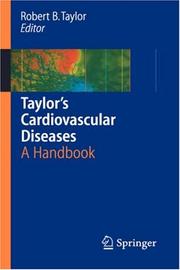
ISBN: 128026313X 9786610263134 0387272763 0387223517 Year: 2005 Publisher: New York : Springer Science,
Abstract | Keywords | Export | Availability | Bookmark
 Loading...
Loading...Choose an application
- Reference Manager
- EndNote
- RefWorks (Direct export to RefWorks)
This handbook addresses the intricacies of providing cardiovascular care and consists of selected chapters from Family Medicine: Principles and Practice, Sixth Edition, the critically acclaimed and widely used reference for family physicians edited by Robert B. Taylor, MD. Internationally recognized contributors examine how to provide high-quality, ongoing care for common cardiovascular problems based on current evidence and time-tested methods in clinical practice. Chapters cover diseases of the heart and blood vessels that primary care physicians often find difficult to diagnose or treat, such as hypertension, ischemic heart disease, dyslipidemia, and venous thromboembolism. Other topics include cerebrovascular disease, cardiovascular emergencies, and medical care of the surgical patient. With a convenient, pocket-sized trim, this book is an indispensable resource for family physicians and others who provide primary care.
Cardiovascular system --- Internal medicine --- Diseases --- Circulatory system --- Vascular system --- Blood --- Circulation --- Family medicine. --- Emergency medicine. --- General Practice / Family Medicine. --- Primary Care Medicine. --- Medicine, Emergency --- Medicine --- Critical care medicine --- Disaster medicine --- Medical emergencies --- Family practice (Medicine) --- General practice (Medicine) --- Physicians (General practice) --- General practice (Medicine). --- Primary care (Medicine). --- Primary medical care --- Medical care
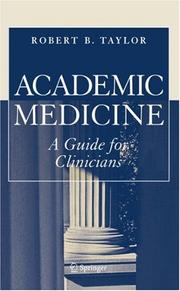
ISBN: 128074376X 9786610743766 0387344500 0387289569 Year: 2006 Publisher: New York, NY : Springer,
Abstract | Keywords | Export | Availability | Bookmark
 Loading...
Loading...Choose an application
- Reference Manager
- EndNote
- RefWorks (Direct export to RefWorks)
Robert B. Taylor, MD, has edited this book that introduces physicians and clinicians to an academic career in the health professions. Written from the clinician’s viewpoint, it guides readers who are considering or who have recently embarked upon such a career through the essentials. Taylor’s approach is practical and well rounded. He integrates evidence-based information from the medical literature with anecdotes from contributors noted for their success in a spectrum of disciplines at top academic medical centers. Taylor addresses the career decision-making process, job hunting, and life in academia. He also focuses on skills for success—from teaching to grant writing. Advice on clinical practice, career management, and the work/life balance is plentiful. The book dispels common myths and outlines errors to avoid. Differences in expectations and culture among teaching hospitals, medical schools, and academic medical centers are considered throughout. Sources for more information are provided as well.
Medical research personnel. --- Medical teaching personnel. --- Academic medical centers. --- Academic health centers --- University medical centers --- Medical centers --- Universities and colleges --- Medical educators --- Medical teachers --- Medical personnel --- Teachers --- Clinical investigators --- Medical researchers --- Medicine --- Research --- Family medicine. --- Medicine. --- Emergency medicine. --- General Practice / Family Medicine. --- Medicine/Public Health, general. --- Primary Care Medicine. --- Medicine, Emergency --- Critical care medicine --- Disaster medicine --- Medical emergencies --- Clinical sciences --- Medical profession --- Human biology --- Life sciences --- Medical sciences --- Pathology --- Physicians --- Family practice (Medicine) --- General practice (Medicine) --- Physicians (General practice) --- Health Workforce --- General practice (Medicine). --- Primary care (Medicine). --- Primary medical care --- Medical care
Book
ISBN: 0520054814 Year: 1985 Publisher: Berkeley, Calif. University of California Press
Abstract | Keywords | Export | Availability | Bookmark
 Loading...
Loading...Choose an application
- Reference Manager
- EndNote
- RefWorks (Direct export to RefWorks)
Sociology of culture --- Social problems --- Social psychology --- 316.62 --- Deviant behavior --- Society, Primitive --- #SBIB:316.23H3 --- Man, Primitive --- Primitive society --- Social evolution --- Deviancy --- Social deviance --- Human behavior --- Conformity --- Social adjustment --- Sociaal gedrag. Leefstijl --- Wijsgerige grondslagen en discussie in de sociologie --- Deviant behavior. --- Primitive societies. --- Social norms. --- 316.62 Sociaal gedrag. Leefstijl --- Primitive societies --- Social norms --- Folkways --- Norms, Social --- Rules, Social --- Social rules --- Manners and customs --- Social control
Book
ISBN: 9780691148519 0691148511 0691163413 1282964550 1400836948 9786612964558 Year: 2011 Volume: *4 Publisher: Princeton: Princeton press,
Abstract | Keywords | Export | Availability | Bookmark
 Loading...
Loading...Choose an application
- Reference Manager
- EndNote
- RefWorks (Direct export to RefWorks)
In the most influential chapter of his most important philosophical work, the Phenomenology of Spirit, Hegel makes the central and disarming assertions that "self-consciousness is desire itself" and that it attains its "satisfaction" only in another self-consciousness. Hegel on Self-Consciousness presents a groundbreaking new interpretation of these revolutionary claims, tracing their roots to Kant's philosophy and demonstrating their continued relevance for contemporary thought. As Robert Pippin shows, Hegel argues that we must understand Kant's account of the self-conscious nature of consciousness as a claim in practical philosophy, and that therefore we need radically different views of human sentience, the conditions of our knowledge of the world, and the social nature of subjectivity and normativity. Pippin explains why this chapter of Hegel's Phenomenology should be seen as the basis of much later continental philosophy and the Marxist, neo-Marxist, and critical-theory traditions. He also contrasts his own interpretation of Hegel's assertions with influential interpretations of the chapter put forward by philosophers John McDowell and Robert Brandom.
Hegel, Georg W.F. --- Consciousness --- History --- Hegel, Georg Wilhelm Friedrich, --- Apperception --- Mind and body --- Perception --- Philosophy --- Psychology --- Spirit --- Self --- Self (Philosophy). --- Self-consciousness (Awareness) --- Self (Philosophy) --- Consciousness - History - 19th century --- Hegel, Georg Wilhelm Friedrich, - 1770-1831 - Wahrheit der Gewissheit seiner selbst --- Self: philosophy.
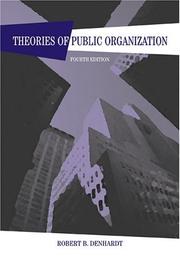
ISBN: 0534612172 9780534612177 Year: 2004 Publisher: Belmont, CA: Thomson/Wadsworth,
Abstract | Keywords | Export | Availability | Bookmark
 Loading...
Loading...Choose an application
- Reference Manager
- EndNote
- RefWorks (Direct export to RefWorks)
Public administration --- #SBIB:35H300 --- #SBIB:35H100 --- #SBIB:35H006 --- 35.07 <73> --- Administration, Public --- Delivery of government services --- Government services, Delivery of --- Public management --- Public sector management --- Political science --- Administrative law --- Decentralization in government --- Local government --- Public officers --- Organisatieleer: algemene werken --- Bestuurlijke organisatie: algemene werken --- Bestuurswetenschappen: theorieën --- Bestuursorganisatie. Openbaar bestuur--Verenigde Staten van Amerika. VSA. USA --- 35.07 <73> Bestuursorganisatie. Openbaar bestuur--Verenigde Staten van Amerika. VSA. USA
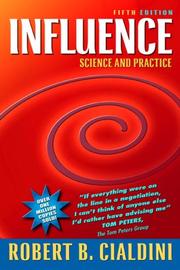
ISBN: 9780205609994 9780205663781 0205609996 0205663788 Year: 2009 Publisher: Boston : Pearson Education,
Abstract | Keywords | Export | Availability | Bookmark
 Loading...
Loading...Choose an application
- Reference Manager
- EndNote
- RefWorks (Direct export to RefWorks)
Praised for enjoyable writing, practical suggestions, and scientifically documented material, previous editions of this title have been widely read by business professionals, fundraisers, and those interested in psychology. This new edition includes more firsthand accounts of how principles presented in the book apply to personal lives; updated coverage of popular culture and new technology; and more on how compliance principles work in other cultures.--From publisher description.
Consumer behavior --- Influence (Psychology) --- Persuasion (Psychology) --- Compliance. --- AA / International- internationaal --- 15 --- 159.9 --- psychologie, sociaal --- sales management --- Psychologie. --- Psychologie --- Sociale psychologie --- sociale benvloeding --- Influence (Psychology). --- Persuasion (Psychology). --- sociale benvloeding. --- Compliance --- Communication --- Conformity --- Propaganda --- Psychology, Applied --- Psychology --- Example --- Compliant behavior --- Cooperativeness --- Persuasion (psychologie) --- Coopération --- Influence (psychologie) --- Coopération
Book
ISBN: 9780674187283 0674187288 Year: 2015 Publisher: Cambridge: Harvard university press,
Abstract | Keywords | Export | Availability | Bookmark
 Loading...
Loading...Choose an application
- Reference Manager
- EndNote
- RefWorks (Direct export to RefWorks)
The American philosopher Wilfrid Sellars ranks as one of the leading twentieth-century critics of empiricism―a philosophical approach to knowledge that seeks to ground it in human sense experience. Sellars stood in the forefront of a recoil within analytic philosophy from the foundationalist assumptions of contemporary empiricists. From Empiricism to Expressivism is a far-reaching reinterpretation of Sellars from one of the philosopher’s most brilliant intellectual heirs. Unifying and extending Sellars’s most important ideas, Robert Brandom constructs a theory of pragmatic expressivism which, in contrast to empiricism, understands meaning and knowledge in terms of the role expressions play in social practices. The key lies in Sellars’s radical reworking of Kant’s idea of the categories: the idea that the expressive job characteristic of many of the most important philosophical concepts is not to describe or explain the empirical world but rather to make explicit essential features of the conceptual framework that makes description and explanation possible. Brandom reconciles otherwise disparate elements of Sellars’s system, revealing a greater level of coherence and consistency in the philosopher’s arguments against empiricism than has usually been acknowledged. From Empiricism to Expressivism clarifies what Sellars had in mind when he talked about moving analytic philosophy from its Humean to its Kantian phase, and why such a move might be of crucial importance today.
General ethics --- Theory of knowledge --- Sellars, Wilfrid --- Empiricism --- Pragmatism --- Expressivism (Ethics)
Book
ISBN: 3319088971 3319088963 1322137668 Year: 2014 Publisher: Cham : Springer International Publishing : Imprint: Springer,
Abstract | Keywords | Export | Availability | Bookmark
 Loading...
Loading...Choose an application
- Reference Manager
- EndNote
- RefWorks (Direct export to RefWorks)
This book is a concise guide on how to preserve, protect and analyse cultural heritage in private and public collections. Its focus is on three-dimensional works of art and archaeology crafted from materials like ceramics, glass, stone, metals, wood etc. It briefly explains the most important aspects of handling, display, storage and analysis of such art works and covers the basics of environmental conditions for an art collection. Numerous practical examples from the author's long experience are shown in high-quality colour photographs.
Museum conservation methods --- Art, Ancient --- Conservation methods, Museum --- Museum techniques --- Cultural heritage. --- Archaeology. --- Cultural Heritage. --- Ceramics, Glass, Composites, Natural Materials. --- Archeology --- Anthropology --- Auxiliary sciences of history --- History --- Antiquities --- Cultural heritage --- Cultural patrimony --- Cultural resources --- Heritage property --- National heritage --- National patrimony --- National treasure --- Patrimony, Cultural --- Treasure, National --- Property --- World Heritage areas --- Ceramics. --- Glass. --- Composites (Materials). --- Composite materials. --- Composites (Materials) --- Multiphase materials --- Reinforced solids --- Solids, Reinforced --- Two phase materials --- Materials --- Amorphous substances --- Ceramics --- Glazing --- Ceramic technology --- Industrial ceramics --- Keramics --- Building materials --- Chemistry, Technical --- Clay
| Listing 1 - 10 of 2664 | << page >> |
Sort by
|

 Search
Search Feedback
Feedback About UniCat
About UniCat  Help
Help News
News